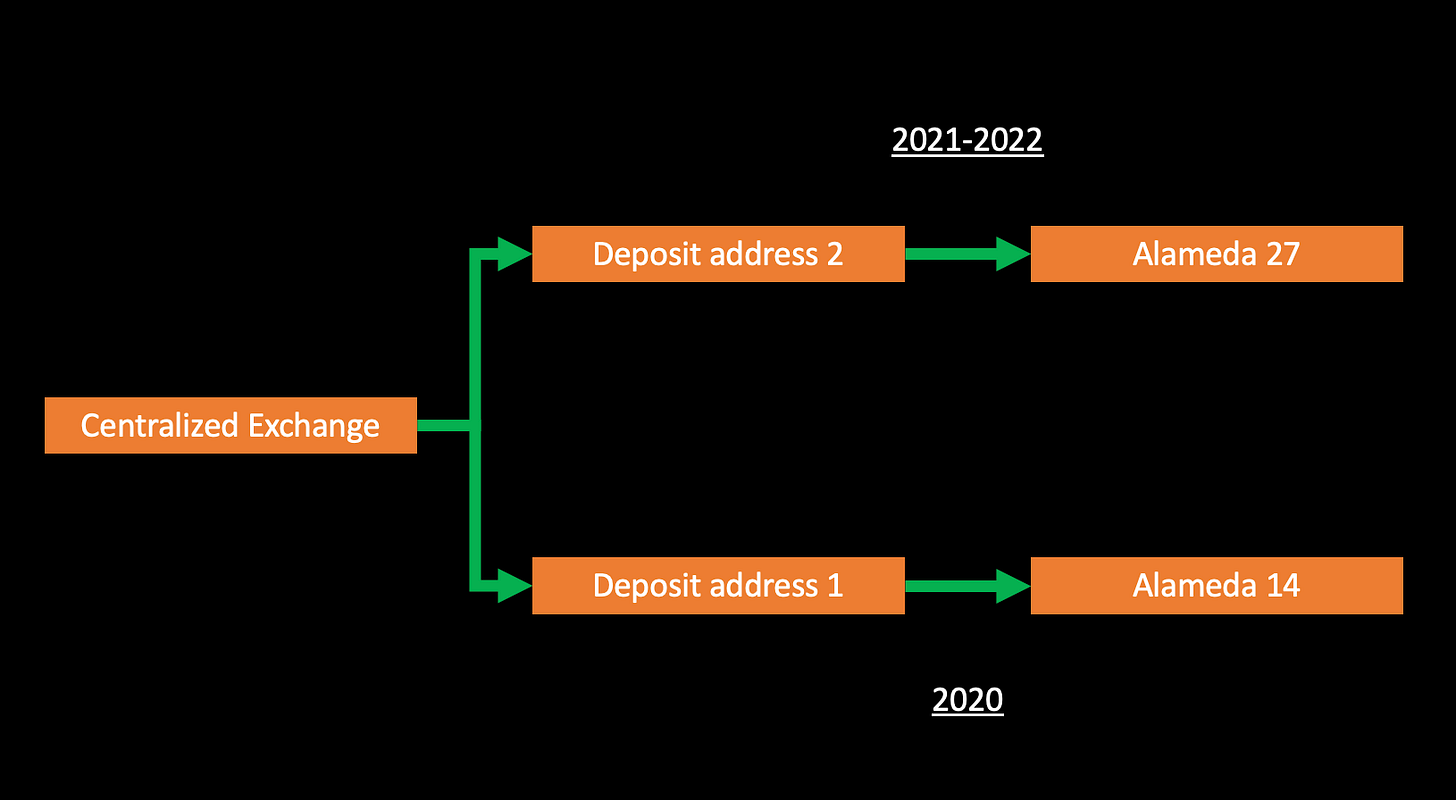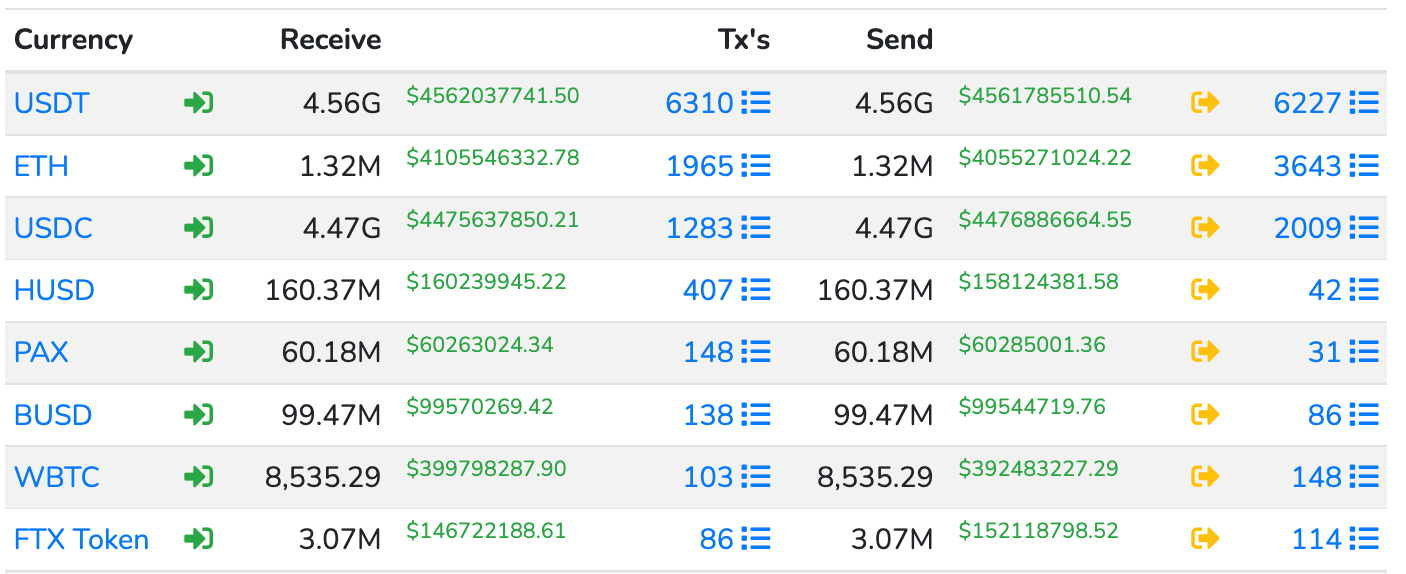Blockchain evidence suggests Genesis Block was a front for Alameda Research
Customer transfers to Genesis Block were sent directly to Alameda's addresses. What kind of hedge fund was this?
Every day there are new revelations about Sam Bankman-Fried’s FTX/ Alameda Research crypto conglomerate. As a refresher, Sam first founded Alameda Research in 2017 as a “crypto hedge fund.” The FTX exchange was subsequently started in 2019. Both firms were based in Hong Kong until 2021, when SBF abruptly moved most of his operations to the Bahamas. However, he maintained close ties to Hong Kong through several subsidiaries and related companies, including an over-the-counter cryptocurrency exchange called Genesis Block.
The Financial Times recently published an excellent report detailing the close ties between Alameda Research and Genesis Block. Genesis Block had a unique business model: It exchanged bags of cash for cryptocurrency.
At the time, Genesis Block was drawing a crowd with its unusual business model: in a world dominated by the web, it was exchanging crypto for physical cash. “People were literally lining up around the corner with bags of cash at Genesis Block,” a former employee said. “Sometimes they shut the door saying they were out of bitcoin.”
Genesis Block also had an innovative approach to banking:
According to Yang, Genesis Block had a “network” of 50 to 100 linked bank accounts, which people familiar with the company said would have been attractive for Alameda as it offered an “on and off ramp” to hard currency. “[We] have a whole network of what we call satellite bank accounts in our control . . . It’s a very grey area, I’m not going to lie. It could sound shady to some people,” Yang said on the podcast.
As FT reporting and a review of public records demonstrates, Genesis Block and Alameda were very closely tied. Both firms started in 2017; both attributed their initial successes to trading the “Kimchi Premium,” a borderline-illegal scheme that capitalized on the difference in Bitcoin prices between Japan, Korea, and the rest of the world. Alameda was a shareholder in Genesis Block, and the two companies shared both leadership and physical office space:
At the time of FTX’s crash, the companies shared the same Hong Kong office block. Cottonwood Grove, a subsidiary wholly owned by Alameda Research, was registered a floor below Genesis Block’s Wan Chai offices. Genesis Block co-founder Clement Ip was a director of FTX’s Hong Kong business, while Charles Yang’s LinkedIn shows him as a partner at Genesis Block. He appeared at events this year as an Alameda Research “principal”. Two people familiar with Genesis Block operations described the company, which also ran a network of bitcoin ATMs across Asia, as being integrated into FTX and Alameda… Some Genesis Block compliance employees and traders also went to work directly for FTX.
While the FT cited insiders who described the company as being “integrated” into FTX/Alameda operations, the extent of that integration was not revealed. Based on new information we have obtained, we can shed light on this relationship: Blockchain transfers suggest Genesis Block was little more than a nameplate, as the funds transferred to Genesis Block appear to have flowed directly to Alameda Research.
Transfers “to Genesis Block” went directly to Alameda Research wallets
Recently, a former Genesis Block customer reached out to Dirty Bubble Media and shared records of over two dozen transactions between themselves and Genesis Block. Over the past two years, this customer had sold thousands of dollars in Ether, Tether stablecoins (USDT), and Circle stablecoins (USDC) to Genesis Block for fiat currency, which was then wired to their bank account. After Genesis Block closed its business in the wake of the FTX failure, this customer had gone back to these records to see where the crypto went after it was sold to Genesis Block. And they found something amazing:
Every single transfer was swept directly into one of two wallets that belonged to Alameda Research.

These addresses were independently verified as belonging to Alameda by both Larry Cermack and by a group of blockchain researchers led by Matt Ranger.
We confirmed that Alameda’s addresses behaved like a customer-facing business by examining the entirety of flows through Alameda 27 over multiple time frames. The address acts as a hub, sending and receiving funds from dozens of other wallets. A priori, this is not what you would expect a hedge fund wallet to behave like:

In every instance we examined, the upstream wallets were originally funded by Alameda to cover transactional costs. This is a common strategy we have seen used by exchanges and other customer-facing blockchain firms, including FTX.
How much in transfers are we talking about? Between its creation in April 2021 to November 2022, Alameda 27 handled over $13 billion in transfers, mostly USDT, USDC, and Ether:

And Alameda 14 transferred over $11 billion between its creation in 2018 to the present:
Obviously, we can’t know for certain how many of these transfers are related to Genesis Block. However, we do note that there appear to be many, many wallets that follow an identical pattern to the one our source identified. It is also worth a reminder that this data only includes transfers on the Ethereum chain. Genesis Block’s business was largely based around exchanging Bitcoin for cash, suggesting that the total volume of this business could have been much larger than what we captured with our analyses.
This discovery highlights just how closely linked Genesis Block and Alameda really were. Based on our data, it appears that much (if not all) of the cryptocurrency ostensibly sent to Genesis Block was actually processed and received by Alameda. In other words, Genesis Block became little more than a customer-facing nameplate behind which Alameda conducted business.
Our findings suggest Alameda wasn’t just a hedge fund. It was acting as an OTC and payment processor for individuals in Hong Kong exchanging cash for cryptocurrency. It remains to be seen what role this exchange business played within the wider FTX/Alameda network…






How can someone send you tips? Do you have e-mail? Or anything besides Twitter?
The deeper the rabbit hole gets the more people realize bank man Fried is a criminal and a fraud, and needs to be locked up for years just like Bernie